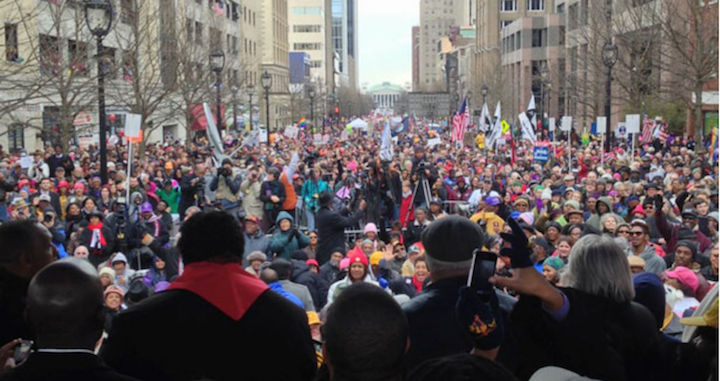EDITOR’S NOTE: This is the third daily meditation in a seven-part series of prayers for the Moral Week of Action coordinated by the Forward Together Moral Movement at 12 state capitols. If you missed them, here are links to the meditations for first two days:
Day 1: Labor and Economic Justice, by Dr. Rodney Sadler
Day 2: Education, by Rev. Nancy Petty
By Jonathan Wilson-Hartgrove
You who hear the cries of all who suffer, listen to your people crying. A mother in Ferguson cries out for justice. Mothers in Central America cry for their children, warehoused on the US border. 150, 000 people in America’s prisons are serving life sentences for nonviolent drug offenses. God of justice, hear their cries, and move swiftly with Your mighty hand to save.
George was not the first person to tell me that young black men in Durham feel hunted by the police. For nearly a decade, I heard this from a generation of teens and young adults in Durham, North Carolina’s Walltown neighborhood. But George was the first person to call me when he was stopped. I was already in bed, but I ran out in my pajamas and witnessed first hand what racial profiling looks like.
The officer told George he pulled them over for rolling through a stop sign. He asked for everyone’s ID. Then he told them to get out of the car while he searched it. When they refused consent, the officer called a K-9 Unit and detained the young men until dogs had sniffed the perimeter of the car. An hour later, he told them they were free to go without even writing a warning ticket.
When I told the officer on the street that night that what he’d done to those young men was wrong, he insisted he was doing his job. So I filed a racial profiling complaint with his chief. After three weeks of a very thorough investigation, the police department concluded that he had, in fact, followed protocol. The young men in my neighborhood were right, I learned. Police were hunting them as a matter of policy.
Protests in Ferguson, MO, this week are only the most recent reminder that racial profiling is not an isolated problem. In urban communities across America, young men like George tell the same story. Whether they find themselves in prison or on the outside, trying to survive with criminal record, they and those who love them cry out for justice. Their cries join with the tens of thousands of undocumented people living in detention centers—with gay folks who, as a matter of law, have been relegated to second-class citizenship.
In the book Exodus, the God of Israel says, “I have indeed seen the misery of my people in Egypt. I have heard them crying out because of their slave drivers and I am concerned about their suffering” (Exodus 3:9). Hearing their cries, God acts to set the Hebrew children free from the abuse and oppression of Egypt’s slave system. But after the people get out of Egypt, God is equally committed to getting Egypt’s plantation economy out of them. “Remember you were slaves in Egypt, ” becomes the refrain in Israel’s law to explain why they welcome the stranger, defend the weak, and guarantee equal protection under the law.
God’s justice, then, is not the justice of powerful people committed to doing what’s right. Powerful people are inevitably blind to the suffering of others. No matter how good their intentions, they don’t see how the systems they manage crush the weak.
God’s justice begins with the cries of those who are suffering. Because all are precious in God’s sight, those who are vulnerable and powerless get a special hearing. Their lives also matter, God insists. “Equal protection under the law, ” means that we must always listen to the cries of people who have been used and abused, overlooked and marginalized.
Fifty years ago this summer, three civil rights workers were brutally murdered during Mississippi summer. Two of them were white, one black. For years black people who insisted that they had a right to register to vote had been fired, threatened, beaten and killed. But the FBI never solved most of those cases. When, however, at the end of the summer of 1964 the bodies of the three civil rights workers were found after a relentless search, Ella Baker said, “Until the killing of black men—black mother’s sons—is as important as the killing of white men—white mother’s sons—we who believe in freedom cannot rest until it comes.”
You who hear the cries of all who suffer, train our ears to hear them also. Stir in us Your great passion for justice, and teach us to remember, whatever our present conditions, that we, too, were once slaves in Egypt. We who believe in freedom cannot rest until it comes for everyone. Amen.

